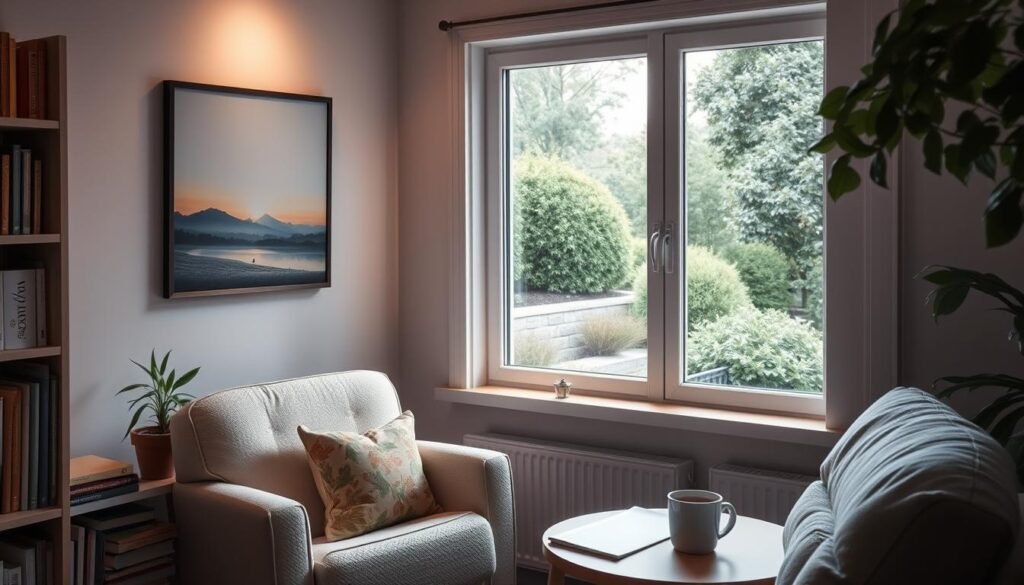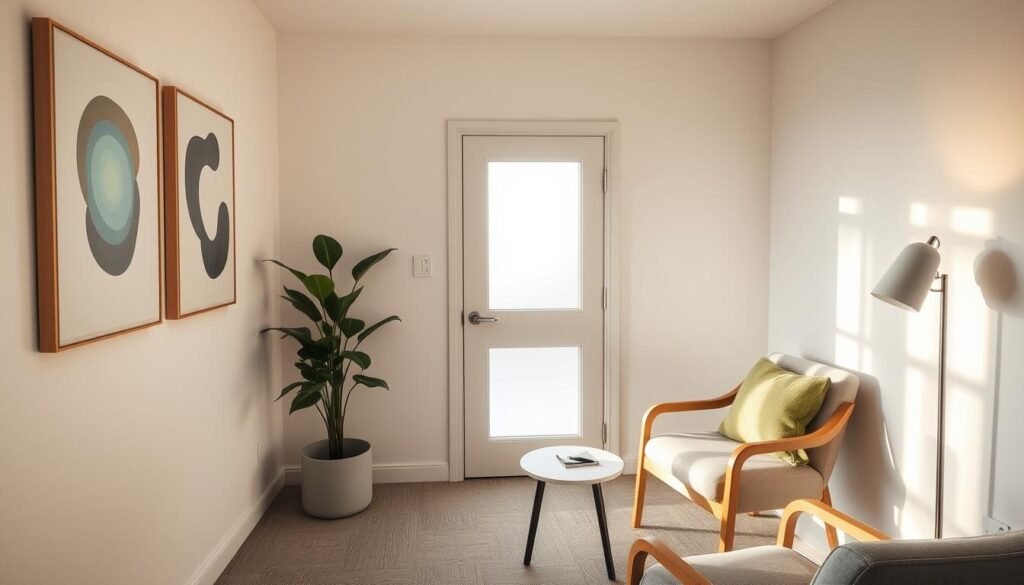Did you know that nearly half of those with ADHD also deal with anxiety, like social anxiety? This fact shows a deep link where ADHD symptoms, such as impulsivity and hyperactivity, can make anxiety worse in social settings. It’s key for anyone dealing with ADHD and social anxiety to understand this connection.
Learning how to handle these issues can improve daily life and boost confidence. Also, it helps in creating positive social experiences. This article will look into ADHD and social anxiety. It will offer useful ways to manage these conditions together.
Key Takeaways
- ADHD and social anxiety often co-occur, creating unique challenges in social interactions.
- Impulsivity and distractibility linked to ADHD can exacerbate feelings of social anxiety.
- Building self-awareness is crucial for understanding how ADHD impacts social situations.
- Cognitive-behavioral therapy (CBT) is an effective treatment when paired with ADHD management.
- Support from friends and family can significantly improve coping with ADHD social anxiety.
- Establishing a routine can help manage both ADHD and anxiety symptoms.
- Gradual exposure to social settings is a recommended strategy to lessen social anxiety.
Understanding the Link Between ADHD and Social Anxiety
ADHD is found in about 4.4% of U.S. adults and up to 10% of children. Social anxiety disorder affects roughly 12.1% of people at some point in their lives. About 30% to 70% of those with ADHD might also have social anxiety. This high overlap highlights the need for deeper understanding.
ADHD is complex; it’s more than just difficulty paying attention. Children with ADHD often feel more anxious, which affects their social lives. This anxiety can lead to trouble making friends and feeling isolated, especially as they become teenagers.
Many adults with ADHD experience anxiety too. This mix makes social situations even harder. ADHD can cause impulsiveness, which might increase anxiety in social settings. People with social anxiety may also struggle to form connections. Sometimes, their anxiety leads them to act impulsively, making social interactions complex.
Treating ADHD and anxiety effectively requires a customized approach. Cognitive Behavioral Therapy (CBT) is a key method for managing symptoms of both conditions. Medicines, like Adderall and Ritalin, also help control these symptoms. Plus, exercise and a regular routine can improve coping strategies for those with ADHD and social anxiety.
Common Symptoms of ADHD and Social Anxiety
The symptoms of ADHD and social anxiety often overlap. This can make it hard to diagnose and treat both. Understanding these symptoms helps to clear up what people experience with both conditions. Symptoms like fidgeting and hard times focusing are common in ADHD. These can make social situations feel worse.
Social anxiety symptoms can also make ADHD symptoms seem bigger. This affects how well people feel overall.
ADHD Symptoms That May Exacerbate Social Anxiety
People with ADHD might show symptoms that worsen social anxiety. Some of these ADHD symptoms are:
- Impulsivity: Quick actions without thinking can increase embarrassment.
- Inattention: Trouble staying focused on conversations can make it hard to connect with others.
- Hyperactivity: Being restless and fidgety might make someone seem uneasy in social spots.
These ADHD traits can make social anxiety feel stronger, especially in new places.
Social Anxiety Disorder Symptoms
Social anxiety disorder (SAD) has many symptoms that also happen in ADHD. Some common symptoms of social anxiety are:
- Fear of Judgment: Worrying about being judged negatively can keep someone from joining in.
- Discomfort in Social Situations: Feeling awkward while talking outside one’s immediate family.
- Avoidance of Social Interactions: Choosing not to go to events that involve socializing.
- Panic Attacks: Feeling intense fear in social settings.
Knowing these social anxiety symptoms is key for those with ADHD social anxiety. It shows how connected these conditions are.
| ADHD Symptoms | Social Anxiety Symptoms |
|---|---|
| Impulsivity | Fear of Judgment |
| Inattention | Discomfort in Social Situations |
| Hyperactivity | Avoidance of Social Interactions |
| Difficulty Managing Emotions | Panic Attacks |
How ADHD Influences Social Interactions
ADHD really shapes how people interact with others. This is mainly because of impulsivity and getting easily distracted. These traits can make social situations hard. People might not get social hints and respond in off ways. This often leads to misunderstandings which can hurt relationships.
Impact of Impulsivity and Distractibility on Social Settings
For someone with ADHD, being impulsive is a big issue. They often cut into conversations. This might make them seem rude or not interested. Being easily distracted makes things worse. They might not catch important social cues. This makes connecting with others tough.
Between 60-70% of people with social anxiety also had ADHD as kids. So, ADHD and social anxiety together make emotional challenges bigger. This makes social events more scary.
Rejection Sensitivity Dysphoria (RSD) in ADHD
Many with ADHD feel RSD. It means they have strong emotional reactions to social slip-ups. They might start avoiding social stuff to dodge rejection. But this can lead to more loneliness. Studies show more than 25% of Americans feel very lonely often. This might be even higher for adults with ADHD. Therapy can help manage RSD. It works on better social skills and emotional strength.
ADHD Social Anxiety: The Cycle of Avoidance
For people with ADHD and social anxiety, avoiding social events is a big problem. This cycle starts when they stay away from social situations. This leads to them feeling more anxious. Avoiding these events makes them believe that social gatherings are scary. It’s important to understand this to increase social activities.
How Avoidance Reinforces Anxiety
Avoiding social events starts a loop that keeps going. When people pull back from social activities, they feel more anxious over time. Social places seem more intimidating, and they avoid them even more. This isn’t just about being scared. It’s also about feeling emotions strongly, more than others might. Knowing this can help in dealing with ADHD and social anxiety.
Identifying Triggers for Social Withdrawal
To break this cycle, we need to know what starts it. Common triggers are:
- Unfamiliar social places
- Bad past social experiences
- Places where you feel judged
- Too much sensory information
Identifying these triggers lets people manage their ADHD and social anxiety better. Using exposure therapy, part of cognitive behavioral therapy (CBT), can help. This method lets people slowly face their fears in a safe way. This reduces their need to avoid situations and helps them see social events in a better light.

| Common Triggers | Potential Strategies to Address |
|---|---|
| Unfamiliar social settings | Practice in familiar environments before going out |
| Previous negative experiences | Cognitive restructuring techniques |
| High-pressure environments | Relaxation techniques and grounding exercises |
| Overstimulation | Scheduled breaks and sensory regulation techniques |
Coping Strategies for Managing ADHD and Social Anxiety
Dealing with ADHD and social anxiety together is tough. But, there are effective ways to get better. A crucial step is building self-awareness. It helps you see how ADHD affects your social life. By understanding this, you can use specific methods to improve your day-to-day life and feel less anxious.
Building Self-Awareness
For those dealing with ADHD and social anxiety, self-awareness is key. It’s important to recognize how you act and how you feel. Here are some ways to help:
- Journaling to note your feelings and reactions in different social situations.
- Reflecting on past social events to find what makes you anxious.
- Engaging in feedback sessions with friends or mentors about your social actions.
Utilizing Cognitive-Behavioral Therapy (CBT)
CBT is a strong way to treat ADHD and social anxiety. It helps change negative thoughts and actions. You’ll learn methods like:
- Gradual exposure to anxiety-inducing situations, allowing individuals to become desensitized.
- Role-playing to improve social skills in a safe setting.
- Mindfulness exercises to better manage anxiety and focus.
Using these methods can really help those with ADHD and social anxiety. It can make them do better in personal and work life.
| Strategy Type | Description | Benefits |
|---|---|---|
| Self-Awareness | Identifying triggers and emotions through personal reflection. | Improved understanding of symptoms leading to better management. |
| Cognitive Behavioral Therapy | Engaging in structured therapy to address negative thought patterns. | Reduction of anxiety through practical coping mechanisms. |
| Mindfulness Practice | Incorporating relaxation techniques and awareness exercises. | Enhanced focus and emotional regulation in social situations. |
Practical Tips for Social Skills Development
For those dealing with ADHD or social anxiety, boosting social skills is key. Being good at chatting can build confidence and lessen loneliness. There are practical steps that help people do better in social situations.
Active Listening and Conversational Engagement
Listening well is key to better conversations. Truly understanding what someone says makes a big difference. Here are some ways to do it:
- Making eye contact to show you’re interested
- Using the “echo technique” by repeating what’s been said to show you get it
- Pausing before you reply to think of what to say next
- Watching for social hints from others to learn more
By trying these methods, people can get better at socializing and make deeper bonds with others.
Managing Impulsivity in Conversations
Controlling impulses is hard for those with ADHD, especially when talking to others. Here are some ways to handle it:
- Picking one or two social skills to get better at first
- Thinking through social situations beforehand to feel less nervous
- Getting cues from friends and family to stay focused in talks
- Practicing difficult chat scenarios to feel more sure of yourself
Using these ideas, a person can keep impulse in check and stay involved in conversations. Building these skills helps deal with complex social settings and make long-lasting friendships.
Want more tips on social get-togethers that help with engagement? Then check out this link.
Creating a Routine to Combat Anxiety
Creating a structured routine is key for those with ADHD and social anxiety. It makes daily life predictable and less scary. This approach helps people feel more at ease every day.
Importance of Structure in Daily Life
A daily routine provides stability. For adults with ADHD, it makes managing tasks easier. Knowing what comes next can reduce anxiety and stress.
This leads to better focus and fewer worries.
Incorporating Movement and Exercise
Exercise is important for mental health. Adding movement to your day lowers stress and boosts health. Try different activities to see what fits into your routine well.
For tips on making a helpful routine, check out this resource. Simple steps like organizing tasks can help you feel more in control.
Healthy Habits to Support Mental Well-Being
Incorporating healthy habits is key for those managing ADHD and anxiety. These practices boost mental well-being. They lay the groundwork for long-term emotional health. Focusing on monitoring diet and improving sleep can greatly enhance daily life and overall happiness.
Monitoring Diet and Sleep Patterns
A balanced diet is crucial for managing ADHD symptoms. Eating protein, whole grains, fruits, and vegetables helps with mood and focus. Eating starches, like pasta or rice, in the evening can help you relax and sleep better. Since many adults don’t get enough sleep, focusing on good sleep habits is vital for brain health.
Before sleeping, thinking about the day’s successes can boost your confidence. Regularly monitoring your diet and sensory experiences helps with emotional control and adds structure to your day.
Limitations of Stimulants and Caffeine
People with ADHD should know that stimulants, especially caffeine, might increase anxiety and disturb sleep. Being careful about how much you consume can help avoid anxiety spikes. It’s wise to pick non-caffeinated drinks, like herbal teas, for their soothing benefits and support of mental well-being.

| Healthy Habits | Impact on Mental Well-Being |
|---|---|
| Balanced Diet | Enhances mood and focus |
| Regular Sleep | Promotes emotional stability |
| Exercise | Improves concentration and reduces anxiety |
| Mindful Practices | Encourages relaxation and reduces stress |
Finding Support: Friends, Family, and Support Groups
Having a strong support system is key for those dealing with ADHD and social anxiety. The support from friends and family offers crucial emotional encouragement. At the same time, support groups provide a space to meet others facing similar struggles. This helps in personal growth and lessens feelings of being alone.
Importance of Sharing Experiences
Being part of a support group can make people with ADHD feel less isolated. They get to share their stories, challenges, and what has worked for them. It’s a space where everyone understands each other, promoting a sense of belonging.
Benefits of Joining Support Networks
There are many benefits to joining support networks for those with ADHD and social anxiety, including:
- Getting to use educational materials and strategies for handling ADHD-related issues.
- Meeting people who get what you’re going through, which can lead to new friendships.
- Receiving guidance from those who have been in your shoes, offering helpful advice.
- A space for parents to exchange tips, concerns, and parenting strategies.
The Attention Deficit Disorder Association (ADDA) offers affordable support groups. These are for different people, like women over 50, parents, and those from varied backgrounds. They cover topics like staying mindful and managing money well.
Also, organizations like NAMI provide free family support groups. They help families of those with mental health issues. In these groups, people share stories, learn how to cope better, and find support among others. Sessions last for 60-90 minutes and are run by knowledgeable leaders. The format lets everyone speak and gain insights from others’ experiences.
Seeking Professional Help for ADHD and Anxiety
Getting help from a pro is key for dealing with ADHD and social anxiety. Knowing when to get help matters a lot for successful treatment. It helps make life better. Understanding the treatment options helps in creating a plan that fits personal needs.
When to Consult a Mental Health Professional
If ADHD and social anxiety are messing with your life, it’s time to get help. Look for signs like:
- Constant trouble with focusing.
- Avoiding people because of anxiety.
- Problems at work or school, or with friends.
- Feeling anxious physically, like sweating too much or shaking.
People facing these issues can really benefit from treatment for ADHD and therapy for anxiety.
Types of Treatments Available
There are many treatments for ADHD and social anxiety:
| Treatment Type | Description |
|---|---|
| Medication for ADHD | Drugs like amphetamines and methylphenidate help control symptoms. |
| Medications for Anxiety | SSRIs and SNRIs can ease social anxiety symptoms. |
| Cognitive-Behavioral Therapy (CBT) | This therapy helps change negative thoughts and is excellent for anxiety. |
| Support Groups | Getting support from others, online or in person, is very helpful. |

Talking to a mental health expert gives access to these helpful options. Picking the right support is important for handling ADHD and social anxiety well.
Conclusion
Dealing with ADHD and social anxiety is hard, but the right coping methods can make a big difference. Knowing how these two issues connect helps people handle their struggles better. Studies have found that 62% of adults with social anxiety also had ADHD as kids. This shows the need for specific help for those dealing with both.
People with the inattentive type of ADHD often face more social anxiety. So, it’s important to find coping strategies that fit their needs. By setting small social goals, practicing mindfulness, and being self-aware, people can become stronger. Working on social skills and having a network of support is key.
To sum up, with the correct support and tools, overcoming ADHD social anxiety is achievable. People can get better at social situations. For more tips and help, check out additional resources on managing ADHD and social anxiety.